Soldiers Welcomed Home
Iraq Veterans Honored by 425th Civil Affairs Battalion
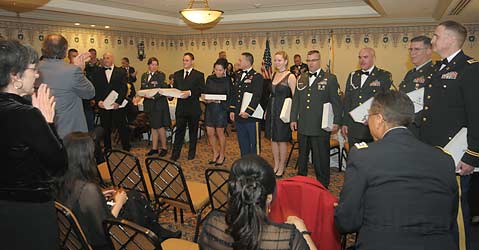
While most of the U.S. Army’s 425th Civil Affairs Battalion is currently deployed in Iraq, about 20 soldiers from the unit who have been stationed there within the past couple of years were officially welcomed home in a ceremony at the Canary Hotel this weekend. Attended by Congressmember Lois Capps and Brigadier General William Beard – the commander of the 351st Civil Affairs Command under which the 425th operates – the event honored the contributions of the returned soldiers to the unit’s mission to “win the hearts and minds” of the Iraqi populace.
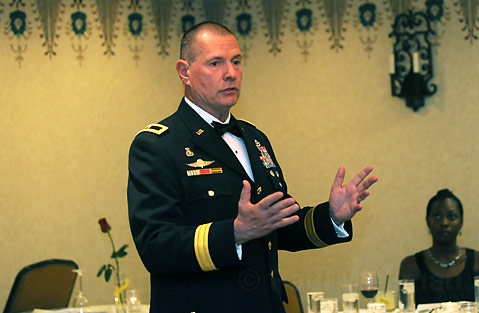
“We can shoot at an enemy all day long, but then their sons and daughters will come back at us,” said Beard, pointing out the importance of having a meaningful interface between the U.S. military and Iraqi officials and civilians. “We deal with intangibles. The infantry takes over a town or an airfield. We’re trying to change attitudes.”
Although the 425th lost no soldiers on its last rotation in Iraq, Civil Affairs units – which are mostly reserve units that are part of the Army’s Special Operations Command – tend to lose more personnel than other support units because of the forays off base required by their work. “To go win a heart and mind, you have to leave the base camp-you might get shot,” said Beard, who also highlighted the role played by soldiers’ families while soldiers are away. “My hat goes off to all the team members and spouses who make things happen.”
The new GI Bill – a legislative action designed to reinstitute the educational funding benefits enjoyed by World War II and Korea veterans for veterans of post-September 11 conflicts – went into effect in August of this year, making most of the 425th’s soldiers eligible for its benefits. “We heard you when you said that veterans need better care when returning home,” said Capps at Saturday night’s ceremony. Capps’s late husband, Congressmember Walter Capps, began teaching a class at UCSB in 1978 that allowed Vietnam veterans to tell their stories to college students – a group that had not welcomed them home a decade earlier. “Now, 30 years later, we are greeting a new generation of veterans,” she said. “We’ve learned a few lessons. We’ve learned how important it is to welcome home those who have served.” Joseph Narkevitz, a Veterans Administration counselor from the center in Ventura – who is a Vietnam veteran himself – praised the government’s efforts to support veterans, saying that his department just received its first budget increase since 1979.
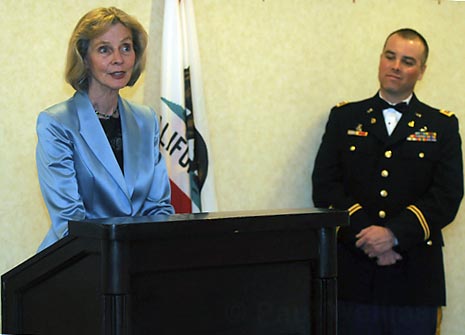
Unit commanders are not yet sure when, but the 425th will make a move to Encino in the not-too-distant future, giving up the building it has occupied on the corner of State Street and Las Positas Road since 1949. According to many in the unit, they have received a tremendous amount of support from the Santa Barbara community, regardless of plans to move. Dorothy Ludington, who served on active duty in the Air Force and as a reservist in the 425th from 1979 to 1994, said that she hasn’t missed a drill weekend since 1979. She is well-liked among soldiers for her efforts to feed and take care of them when they’re at the reserve center every month. “When the soldiers don’t worry about their families, they can concentrate on staying alive and doing their job in the combat situation,” she said. Ludington has also been a food stamp eligibility worker for Santa Barbara County since 1977, and will retire at the beginning of next year.
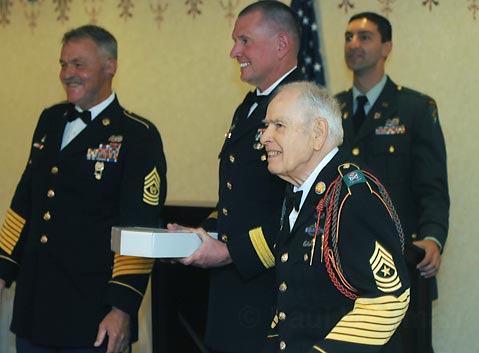
The public affairs officer assigned to the Iraq-deployed detachment of the 425th, Major Allan Dollison, said that one of their main tasks this winter will be to assist the Iraqis with this year’s presidential election, which are scheduled for January 31. As the Noncommissioned Officer in Charge of elections during the first Iraqi prrovincial election on December 17, 2005, Sergeant Jeffry Tanner oversaw about 250 polling sites around the country. “There were just normal, everyday guys who volunteered to be election officials, even though if people knew they were election officials, they could be killed,” he said. “They were scared to death, but democracy was that important to them.” He continued that in an effort to reduce the incidence of car bombings, the Iraqi government did not allow people to drive on election day in 2005, but that some people walked up to 300 miles just to vote.
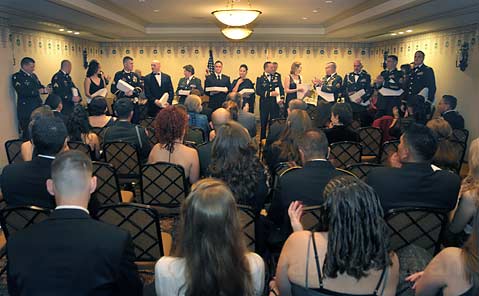
Major David Bradford, commander of the detachment of the 425th left behind to keep the home fires burning, was one of the soldiers honored in the ceremony, and said that the purpose of having civil affairs units isn’t necessarily to win hearts and minds, but to influence people that democracy is a better way of doing things. “For every guy like us, there’s an Al Quaeda guy out there telling [Iraqis] that America is evil-we have to counteract that,” he said, noting that much of their work revolved around getting to know local leaders and laws, finding out what is important to people in the region, and helping them solve problems. He said that while most people are working earnestly to rebuild infrastructure and improve things, the country has a few scammers attempting to take advantage of the development taking place. Bradford, however, works for the Nevada Gaming Control Board, and said he knows how to pick out the players.
Many of the 425th’s troops currently serving in Iraq are on their second, third, or even fourth yearlong deployment, and some of the soldiers who were welcomed home this weekend may find themselves deployed again. As reservists, they put jobs, school, and families on hold while they are away, but some actually volunteer for repeat deployments. “Never in my experience have I seen such a dedicated group of soldiers,” said retired Command Sergeant Major Jonathan Church, who had served with the 425th.



